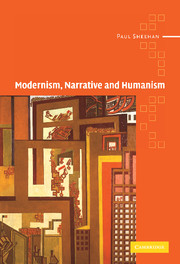Book contents
- Frontmatter
- Contents
- Preface
- Acknowledgments
- Introduction: The anthropometric turn
- 1 Narrating the animal, amputating the soul
- 2 Conrad and technology: homo ex machina
- 3 The Lawrentian transcendent: after the fall
- 4 Woolf's luminance: time out of mind
- 5 Doubting Beckett: voices descant, stories still
- Conclusion: Humanness unbound
- Notes
- Bibliography
- Index
- Frontmatter
- Contents
- Preface
- Acknowledgments
- Introduction: The anthropometric turn
- 1 Narrating the animal, amputating the soul
- 2 Conrad and technology: homo ex machina
- 3 The Lawrentian transcendent: after the fall
- 4 Woolf's luminance: time out of mind
- 5 Doubting Beckett: voices descant, stories still
- Conclusion: Humanness unbound
- Notes
- Bibliography
- Index
Summary
To have humanism we must first be convinced of our humanity. As we move further into decadence this becomes more difficult.
Thomas PynchonThe decades since the end of the Second World War have been notable for precipitating, among other radical changes, a thoroughgoing reappraisal of what it means to be human. Changes in political practice and intellectual rationale, and recent scientific endeavours such as the Genome Project and embryonic-stem-cell research, have raised serious doubts as to how secure that elusive category, the ‘human’, really is. And as the measure of these changes is still being taken, postwar theoretical discourse has transformed the human from a discrete, intuitively understood idea (or ideal) into a site of contention, where notions of hybridity, contradiction and dispersion circulate freely and abundantly. The more knowledge we have of the human, it now seems, the more it slides from our grasp.
Since the Renaissance first brought the notion into modern Western consciousness, the various humanisms that have burgeoned –Enlightenment, liberal, existential – have assumed a degree of certainty about what it means to be human. In most instances this is supported by appeals to intrinsic rational, moral and axiological dimensions, and a belief in a universal human nature and/or condition.
- Type
- Chapter
- Information
- Modernism, Narrative and Humanism , pp. ix - xiiPublisher: Cambridge University PressPrint publication year: 2002



